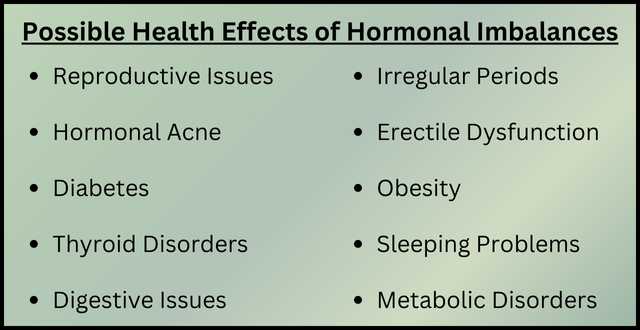Medically Reviewed by Lucas Rosa, PhD in Molecular Biology

Learn about how significant hormonal balance is for our bodies.
What Is Hormonal Balance?
Hormones are crucial in nearly every function of our body, from converting food to energy to influencing our mood. They are the body’s chemical messengers that travel through the bloodstream to organs and tissues, instructing them on how to operate.
For instance, insulin regulates our blood sugar levels, cortisol helps manage our body’s stress response, and thyroid hormones control our metabolism. Estrogen and testosterone are crucial hormones for reproductive health, while progesterone plays a role in regulating the menstrual cycle.
Hormonal balance is the state where the hormones in our body are at their optimal levels and working in harmony. While hormones fluctuate naturally at different stages of life (ex: during puberty, pregnancy, and menopause), they need to remain within a specific range to keep our bodies functioning properly.
Maintaining hormonal balance is crucial not only for our physical health but also for our emotional and mental well-being. When our hormones are balanced, our bodies operate smoothly, leaving us feeling healthy, energized, and focused.

Benefits of Maintaining Hormonal Balance
A body with balanced hormone levels is linked to numerous health benefits. Here are some main ways how maintaining hormonal balance can positively affect our health:
- Improved Energy Levels and Mood Stability: Balanced hormones help regulate your sleep-wake cycle, resulting in better energy throughout the day and more stable moods.
- Better Reproductive and Sexual Health: For both men and women, balanced sex hormones are essential for a healthy libido, fertility, and overall reproductive function.
- Reduced Risk of Chronic Diseases: Maintaining hormonal balance helps reduce the risk of chronic health conditions like diabetes, heart disease, thyroid disease, and obesity.
- Weight Management: Optimal hormonal levels are crucial for regulating metabolism (the process of breaking down food for energy) and supporting a healthy weight.

Key Ways To Maintain Hormonal Balance
Fortunately, there are natural ways to support our hormones and maintain hormonal balance. Here are some practical tips and strategies to help keep your hormones functioning at their best:
- Adopt a Hormone-Friendly Diet: Include nutrient-dense foods that support hormonal health, such as leafy greens, omega-3-rich foods, healthy fats, and foods high in fiber.
- Exercise Regularly: Engaging in moderate exercise helps support overall hormonal balance. Aim for activities that you enjoy, whether it’s walking, yoga, or strength training.
- Prioritize Quality Sleep: Sleep is essential for proper hormone regulation. Aim for 7-9 hours of restful sleep each night to help maintain hormonal balance.
- Manage Stress: Indulge in stress-reducing activities and relaxing hobbies, such as journaling, reading, deep breathing, or meditation. These practices help lower cortisol levels and enhance your mood.
- Avoid Hormone-Disrupting Chemicals: Minimize exposure to harsh chemicals, plastics, and pesticides whenever possible. Choose natural, organic, or non-toxic alternatives.

Signs of Hormonal Imbalance
Hormonal imbalances in one or more of your hormones can lead to a range of health issues. Here are some common symptoms that might signal a hormonal imbalance in your body:
- Physical Symptoms: If you’re experiencing unexplained weight gain, fatigue, skin issues (like acne or dry skin), or hair loss, it could be a sign of hormonal imbalance. These symptoms are often linked to imbalances in insulin, cortisol, and thyroid hormones.
- Emotional and Mental Symptoms: An imbalance in your hormone levels can impact your mood by causing irritability, anxiety, or even depression. You might also have trouble concentrating or feel a lack of motivation, which could indicate an imbalance in hormones like serotonin or dopamine.
Left untreated, chronic hormonal imbalance can contribute to serious health issues such as diabetes, cardiovascular diseases, thyroid disorders, or infertility.

Factors That Disrupt Hormonal Balance
Hormones are sensitive to many factors, and there are several lifestyle habits that can easily throw them off course. Here are some key hormonal disruptors:
- Poor Diet: Diets high in sugar, highly processed foods, and unhealthy fats can wreak havoc on hormones. For example, studies have proven that consuming too much sugar or foods high in sugar can spike insulin levels, causing insulin resistance and other metabolic problems.
- Chronic Stress: Prolonged elevated levels of stress lead to elevated cortisol levels, which can suppress the production of other important hormones like thyroid hormones and sex hormones.
- Lack of Sleep: Getting less than 7-8 hours of sleep can disrupt your body’s natural circadian rhythm, which in turn directly impacts hormone production.
- Environmental Toxins: Hormone disrupting chemicals found in plastics, pesticides, pollution, and household cleaners can interfere with the functioning of our hormones. These substances either mimic or block hormones, leading to hormonal imbalances.
- Lifestyle Habits: Being sedentary or over-exercising can both have negative effects on hormonal health. Sedentary behavior can reduce insulin sensitivity, while excessive exercise can lead to cortisol overproduction.

– Read the labels on products and choose more natural or organic products to help avoid these chemicals.
Lifestyle Tips That Help Balance Hormones
Maintaining hormonal balance doesn’t require drastic changes, it’s about adopting small, consistent habits that support your body’s natural rhythms. Here are some simple lifestyle tips:
- Establish a Routine: Set regular times for eating, sleeping, and exercising. Maintaining a consistent routine helps support hormonal balance and regulate your body’s internal clock.
- Stay Hydrated: Drink plenty of water throughout the day to support overall health and hormonal function. Dehydration can impair hormone production and affect your well-being.
- Mindful Eating: Pay attention when you are eating and prioritize balanced meals that include nutrient-dense, whole foods. Avoid overeating or skipping meals, as either can interfere with hormonal balance.

Conclusion
Achieving optimal hormonal balance is what your body needs for overall health and well-being. Prioritize your hormonal health with simple lifestyle changes, and you’ll feel more energized, balanced, and ready to take on whatever life throws your way.
Remember, maintaining hormonal balance isn’t just about managing symptoms, it’s about nurturing your body and mind for long-term health.
Sources:
Calcaterra, Valeria, et al. “How the Intricate Relationship between Nutrition and Hormonal Equilibrium Significantly Influences Endocrine and Reproductive Health in Adolescent Girls.” Frontiers in Nutrition, vol. 11, 14 Mar. 2024, www.ncbi.nlm.nih.gov/pmc/articles/PMC10973102/, https://doi.org/10.3389/fnut.2024.1337328.
Cleveland Clinic. “Hormonal Imbalance: Causes, Symptoms & Treatment.” Cleveland Clinic, 2022, https://my.clevelandclinic.org/health/diseases/22673-hormonal-imbalance.
Corinne O’Keefe Osborn. “Everything You Should Know about Hormonal Imbalance.” Healthline, Healthline Media, 18 Dec. 2017, www.healthline.com/health/hormonal-imbalance.
Panhandle Obstetrics & Gynecology. “5 Signs You’re Healthy in the Hormone Department.” Panhandle Obstetrics & Gynecology, 2025, www.panhandleobgyn.com/post/5-signs-youre-healthy-in-the-hormone-department.
UCLA Health. “7 Signs of a Hormonal Imbalance — and What to Do about It.” UCLA Health, UCLA, 3 July 2024, www.uclahealth.org/news/article/7-signs-hormonal-imbalance-and-what-do-about-it.
Segarra, Ignacio, et al. “Women’s Health, Hormonal Balance, and Personal Autonomy.” Frontiers in Medicine, vol. 10, 30 June 2023, https://pmc.ncbi.nlm.nih.gov/articles/PMC10347535/, https://doi.org/10.3389/fmed.2023.1167504.
Check Out
HF Swaps
Better products for better hormone health.









